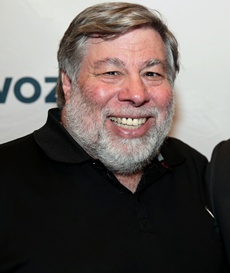Steve Wozniak blasts Indian education, says creativity not rewarded
27 Feb 2018
Steve Wozniak, the engineer-inventor who cofounded Apple along with Steve Jobs, doesn't quite agree with the likes of tech czar Elon Musk and physicist Stephen Hawking who say artificial intelligence poses a threat to humanity, saying he doesn't expect AI to become smart enough to replace the human brain, and that fears of job losses to AI are exaggerated.
 | |
| Steve (The Woz) Wozniak |
In an interview with The Economic Times, 'The Woz' also had some harsh words about Indians' lack of creativity, saying the that the Indian education system is based on rote learning and doesn't encourage creativity.
He said he does not believe that there will be any big tech company or breakthrough in India similar to Google, Facebook or Apple. According to the Woz, India has just Infosys as an example of a big tech company and even that is not innovative. He does not expect Infosys to be in the league of global tech giants anytime soon.
"I am not an anthropologist and I don't know the culture of India well enough," Wozniak said. "(But) I don't see those big advances in tech companies. What is the biggest tech company here, Infosys, maybe? I just don't see that sort of thing coming out of Infosys and I have done keynotes for them three times."
He said people in India aren't encouraged to pursue creative careers. "The culture here is one of success based upon academic excellence, studying, learning, practising and having a good job and a great life. For upper India, not the lower. I see two Indias.
''That's a lot like Singapore - study, study, work hard and you get an MBA, you will have a Mercedes but where is the creativity? The creativity gets left out when your behaviour is too predictable and structured, everyone is similar. Look at a small country like New Zealand, the writers, singers, athletes, singers, athletes, it's a whole different world," said Wozniak.
On AI, he said, ''No machine sits down and says; 'humm, what should I work on?' Humans tell machines what to work on. Machines just do it well for us. We are building technology which will make things easier for us. Machines do just the grunge work billions of times faster also that we can apply our minds to other things.''
On the loss of jobs to automation, he pointed to the industrial revolution in England 250 years ago, and suggested that while the nature of jobs might change, it would not lead to serious joblessness, adding that in the US at least, hardly anyone was jobless despite the increasing automation.
Asked specifically about Bill Gates and Elon Musk pointing to the dangers of AI, he said, ''Stephen Hawking said the same thing. I was saying the same things for almost two years before they were. Then, I thought a lot about it, what is intelligence. These machines are not even close to intelligence. They don't work like the human brain.
''I studied human brain deeply, almost got my degree in psychology. There is no machine which sat down and said 'what should I do today?' Machines don't think that way. They can only do things we tell them very specifically - and that also after being told a billion times. That's not intelligence. That's not even more intelligence than picking up a red bone and putting in a red box.''


















